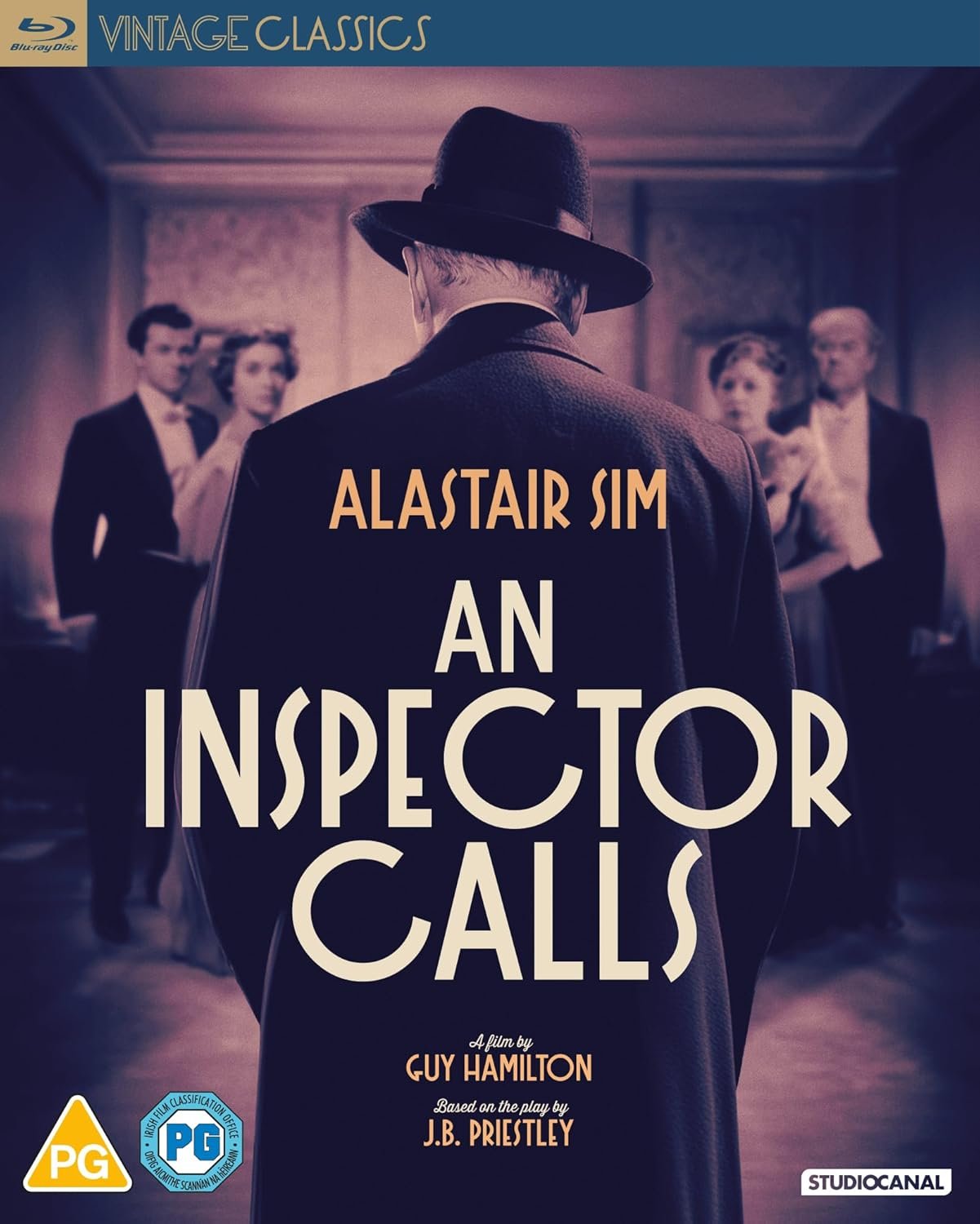An Inspector Calls │ StudioCanal
by JAMES CAMERON-WILSON
An Inspector Calls, freshly minted with a pristine print of pin-sharp clarity, was originally written as a play by J.B. Priestley and remains a damning indictment of England’s hypocritical upper middle-classes. Set in 1912 in the north Midlands, the play premiered in 1945 in Moscow of all places, before coming to London a year later and to Broadway a year after that. I can’t tell you who was in the Russian version, but in the West End the titular character was taken by Sir Ralph Richardson, with Margaret Leighton, Harry Andrews and, in the Bryan Forbes part, none other than Alec Guinness. Imagine seeing that bunch on the London stage! I say the Bryan Forbes part, as it was he who had one of his best roles as Eric Birling in the 1954 film, running the gamut from embarrassing drunk to tipsy flirt to indignant son in the course of the action’s trim eighty-minute running time. The play has been opened up in the film version to include the pivotal character of Eva Smith, played here by Jane Wenham, the first wife of Albert Finney. I mention Albert Finney because he, like Alastair Sim, turned down a knighthood and it is Alastair Sim, in one of his most famous parts, who is the inspector who calls. “The name’s Poole, Inspector Poole,” he announces himself one transformative evening at the household of the well-to-do Birling family, under the direction of Guy Hamilton. Just ten years later, Guy Hamilton was to direct Goldfinger in which Sean Connery, as James Bond, uttered his immortal introduction, “the name’s Bond, James Bond.”
Be that as it may, the film version of An Inspector Calls starts conventionally enough, in an opulent dining room where the Burling family is celebrating the engagement of their daughter Sheila (Eileen Moore) to the gallant Gerald (Brian Worth). It is the very model of a modern major family, where the patriarch, Arthur Birling, played by Arthur Young, declares, “when you’re living in 1912, you’ve got to think like 1912. The world is developing so fast, it will make war impossible.” The only ripple on the surface is young Eric’s drunkenness until the sudden emergence (through the French widows) of the daunting figure of Inspector Poole. Apparently, a young woman has committed suicide from imbibing bleach and a few questions need to be asked. Not that any of the Birling clan – “we are all respectable citizens”, Gerald Croft reassures the stranger – could be guilty of murder, if that is what Poole is inspecting – or suspecting. But J.B. Priestley was a socialist and this is a play, a mystery, about consequences.
The deceased is none other than a poor shop girl from the lower classes and could have no connection to the respected citizens of this affluent household. Or could they? Inspector Poole has in his wallet, or note book, a photograph of the unfortunate woman, who he will only show (at first) to Arthur Birling, the local magistrate who is expecting the knighthood that Alastair Sim turned down. As the owner of a factory, Arthur was responsible for discharging the girl from his employ, starting a chain reaction that was to lead to devastating circumstances. Besides Bryan Forbes – who is very good – I was unfamiliar with the cast other than Alastair Sim, whose understated comic menace is the backbone of the film. There is just no other actor like Alastair Sim, either in appearance or in delivery, and he makes the part his own, although I can just about picture Ralph Richardson giving his own singular interpretation. In spite of its age, the film still casts quite a spell and the refurbished print is a joy to behold. The 4K restoration includes the usual excellent extras, including an interview with Jane Wenham, a summary of the film and its history from the film critic Anna Smith and an engaging commentary from the American film historian David Del Valle. It’s out now on 4K UHD, Blu-Ray, DVD and digital.
STUDIOCANAL’s release of An Inspector Calls is now available on Blu-ray and in 4K
STUDIOCANAL is Europe’s leader in production, distribution and international sales of feature films and series, operating in all nine major European markets - France, United Kingdom, Germany, Poland, Spain, Denmark and Benelux - as well as in Australia and New Zealand. It owns the largest library in Europe and one of the most prestigious film libraries in the world, boasting more than 8,000 titles from 60 countries, which span 100 years of film history. 20 million euros has been invested into the restoration of 750 classic films over the past 5 years. Known for releasing a stunning roster of incomparable vintage classics titles, StudioCanal’s releases include outstanding thrillers, heart-rending masterworks, horror favourites, war dramas, Ealing comedies, and plenty of lesser-known gems. The collection boasts some of the greatest and beloved stars of British cinema.

